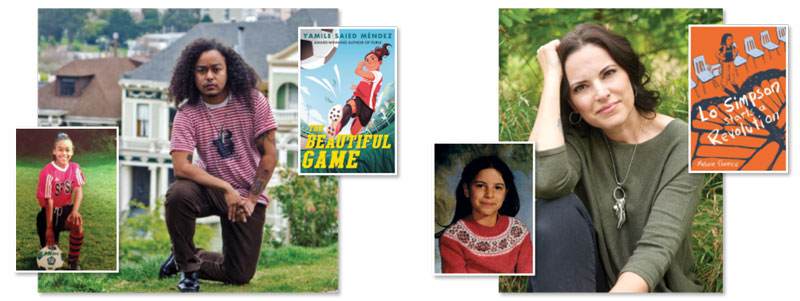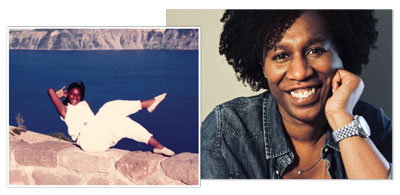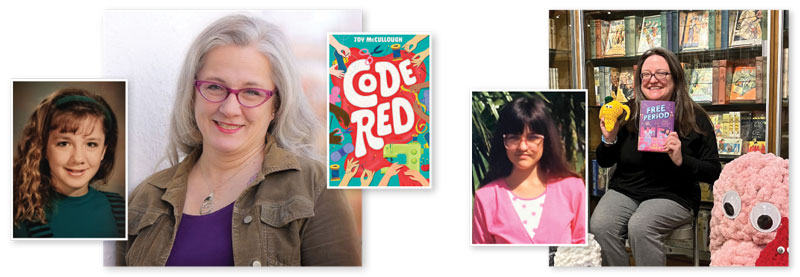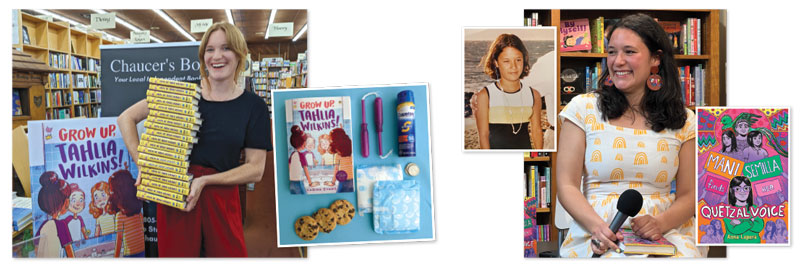Let’s Talk Periods: Middle Grade Books About Menstruation
Centering dignity and equity, authors strive to normalize the topic of menstruation and show how different people experience it.
 |
From left: Veeda Bybee and Yamile Saied Méndez at the launch event for Calling the Moon at the Orem (UT) Public Library; Saadia Faruqi; Aida Salazar.Courtesy of Veeda Bybee; Photo courtesy of the authors |
In Louise Fitzhugh’s 1965 novel The Long Secret, a scared Beth Ellen asks her friends Harriet and Janie, “Aren’t there little rocks that come down and make you bleed and hurt you?” Their multipage conversation about menstruation was unusual for the time. Five years later, Judy Blume famously took that period conversation much further with Are You There God? It’s Me, Margaret.
It is fair to say that prior to these books, menstruation was a taboo topic in middle grade and YA literature, and there has been scant reference since then. But more than 50 years post-Margaret, the tide is finally changing. Middle grade books are not just mentioning periods but centering entire plots on them. Focusing on a range of experiences and emotions, authors are destigmatizing menstruation with stories that remove silence, shame, and secrecy and offer a new way to talk about periods, one full of dignity and honesty.
Getting one’s period, a deeply personal event, brings a host of feelings, including fear, joy, and apprehension. But historically, the dominant message has been that bodies and their functions are shameful or embarrassing to discuss. Aida Salazar was inspired to disrupt that with The Moon Within (Scholastic, 2019), written when her daughter approached puberty. Salazar, who is Latina, says in the process of publishing her novel, she discovered some surprising facts. “I was told by the research librarians at Scholastic that there had not been a fictional book centered on menstruation since Judy Blume’s seminal book. I was the first woman of color to ever write about the subject in a middle grade novel. At first, I felt like it was such an honor but not long after, I felt it was a travesty.”
 |
From left: Mason J. at 11 and today; Melanie Florence tween and today.Photos courtesy of the authors |
Following that novel, Salazar and Argentine American author Yamile Saied Méndez, whose master’s thesis was on the lack of representation of puberty and menstruation in middle grade literature, created the anthology Calling the Moon: 16 Period Stories from BIPOC Authors (Candlewick, 2023). “We wanted to be inclusive and hopefully spark conversations from different points of views,” says Méndez.
The result is a collection of stories about menstruation from many diverse communities. Salazar’s story for Calling the Moon portrays a gender-fluid, or xochihuah, character. There’s also a story about a nonbinary character, Shiloh, from author Mason J., who says, “It was essential for me to authentically represent the challenges and complexities of gender variance during adolescence.”
For Saadia Faruqi (Saving Sunshine), who is Pakistani American, being included in Calling the Moon provides important representation. “Muslims are often left out of discussions related to puberty, much of which is a result of internal cultural taboos regarding this topic,” she says. “I wanted to make sure my young Muslim readers feel seen.” Faruqi’s short story discusses a history of Muslim women hiding periods from male family members. She wants readers to “realize that there’s nothing dirty or shameful about having periods, that it’s OK to talk about it.”
Depicting periods as a time of renewal was the focus of Veeda Bybee’s contribution. “By weaving in the Chinese cultural significance of experiencing Tian Gui or Heavenly Water, I wanted to show periods as empowering,” Bybee says.
 |
Leah Henderson, tween and present dayPhoto courtesy of the authors |
While representations and accounts of experiences are important, the education the stories provide is just as key. Leah Henderson, who is Black, looks at her Calling the Moon story as a chance to educate and reassure. “I wanted to write a story filled with support, but one that also hopefully addresses possible questions for those who do not have it,” says Henderson.
 |
From left: Joy McCullough, Ali TeresePhotos courtesy of the authors |
Age-appropriate information
Such stories are welcome now, because in the real world, things are complicated regarding girls and periods. Many states have passed bills requiring free menstrual products be provided in schools—but not all those states get the funding to supply those products to schools. Meanwhile, other states, like Florida, are working to pass legislation prohibiting discussions and education about human sexuality, including menstruation, in elementary grades.
According to the National Institutes of Health, the average age of menstruation onset is 12.4 years, with 10–16 being a normal range. This makes it an age-appropriate issue for elementary and young middle grade students. But many people still disagree.
While writing her middle grade novel Free Period (Scholastic, Mar. 2024), Ali Terese was surprised by the common misconception that periods are a topic only for high schoolers.
“To understand why these stories are necessary and vital in the middle grade space, we’ve had to acknowledge that menstruation can begin as early as third grade, with the average around sixth grade,” says Terese, whose book is about two middle school pals who campaign for free maxi pads at school.
[Read: “Period Power”: 11 YA and Middle Grade Titles That Destigmatize Menstruation]
Terese was drawn to the subject from her own experiences and parenting conversations. “I experienced so much physical pain and shame around my period as a child that I didn’t know how I would talk about it in a positive way as a parent,” she says. “So I did what writers do and spent 60,000 words figuring it out.”
Author Karina Evans has also seen comments that the intended audience for her book, Grow Up, Tahlia Wilkins! (Little, Brown, 2022), is too young for the subject matter. In Evans’s novel, seventh grade Tahlia gets her period when her mother is out of town, leaving her alone—with her not-yet-menstruating best friend—to figure out how to obtain and properly use menstrual supplies.
“It’s alarming, because middle school is the most common time that people will get their first period,” Evans says. “I think it is important that the topic is discussed and understood long before it is experienced.”
 |
From left: Karina Evans, her book, along with items mentioned in it; Anna Lapera when she was 12, and today.Photos courtesy of the authors |
Activism and changing terminology
In some of these books, authors’ spotlights on period poverty, equity, and activism help both characters and readers consider experiences beyond their own. Joy McCullough’s motivation to write Code Red (S. & S./Atheneum, 2023) came from her editor, Reka Simonsen. “She told me about Days for Girls, an organization that recruits crafters to sew cloth menstrual pads and distributes them to people in developing countries,” says McCullough, who is white. “I knew period poverty is an issue in the United States as well.” McCullough’s character, Eden, is an activist focusing on period poverty, the inability to access and afford necessary hygiene supplies.
Canadian author Melanie Florence also examines menstrual equity in Lo Simpson Starts a Revolution (Orca, Apr. 2024). “The fact that there are still schools who don’t provide period products in all the restrooms is something that I wanted to address,” says Florence. Lo advocates for shame-free, school-wide access to products with the help of a diverse, impassioned group of friends.
Guatemalan American Anna Lapera’s Mani Semilla Finds her Quetzal Voice (Levine Querido, Jan. 2024) is about activism and bodily autonomy and also centers the need for increased access to menstruation supplies. “I wanted to showcase the challenges students often face when they get their period at school.” Many young people often get their periods unexpectedly and aren’t prepared. They lose learning time and endure stress when they have to miss class to chase down supplies, discover empty machines, or have to ask a nurse for a pad or tampon.
As more people talk about periods, a major change is also happening in how they discuss individuals who menstruate. The language is moving away from binary terms, referring less to “girls and women” or “feminine products” and more to “menstruators” and “period products.” With the inclusion of Salazar’s Mar, Mason J.’s Shiloh, and McCullough’s Will, a trans boy, the narratives are changing with the times.
[Read: Go with the Flow]
Salazar also points to the forthcoming Ollie in Between by Jess Callans (Macmillan, Apr. 2025), which stars a nonbinary main character experiencing puberty. “I know that all of us together are going to dismantle that negative narrative and transform it for the better,” Salazar says.
 When it comes to words, even simply using the term period and avoiding euphemisms can feel revolutionary. “Using accurate, direct language helps bring periods out of the shadows,” Terese says. “There is power in saying ‘periods’ out loud, and once one person says it, that can make it more comfortable for other people in their lives to speak out as well.”
When it comes to words, even simply using the term period and avoiding euphemisms can feel revolutionary. “Using accurate, direct language helps bring periods out of the shadows,” Terese says. “There is power in saying ‘periods’ out loud, and once one person says it, that can make it more comfortable for other people in their lives to speak out as well.”
The more stories readers see about periods, normalizing the topic, the less tentative authors and publishers may be to take up this mantle. Méndez’s forthcoming The Beautiful Game (Algonquin, Sept. 2024) features a girl playing for an all-boys soccer team who gets her period during a game. Méndez says it took several years for a publisher to buy the book.
But getting books about periods published doesn’t guarantee kids will be free to read them. Some have experienced bans, soft censorship, and other pushback that has limited their reception and addition to collections or curricula. The Moon Withinhas appeared on banned books lists in several states. “It’s infuriating. For every ban, it means less access for kids to the books,” Salazar says. “I can count on one hand how many times I have visited schools for The Moon Within or Calling the Moon.” Méndez hasn’t had a single school visit request for Calling the Moon.
For children who can access these stories, the takeaway messages affirm a wide intersection of identities, provide inspiration for action, and help remove stigma. “It’s a normal bodily function that happens to half the population,” McCullough says; that should extinguish feelings of shame and isolation. Henderson views these stories as a chance for connection. “It is nothing to hide or be ashamed of sharing and might just be an opportunity to bond with someone who might understand what you are experiencing.”
Salazar adds, “My wish is that young readers feel empowered, honored, and loved.”
An important takeaway for Lapera, beyond the simple fact that “periods are worthy of a story,” is that she wants her protagonist’s journey “to inspire agency, to shed light on the importance of feeling physically safe and respected in schools, to demand the respect of our bodies, and [to show] that there are many ways to be an activist.” And as Terese says of her young activist characters, “I hope that a couple of chaotic besties having laugh-out-loud fun while fighting for menstrual care will help break the ice on this issue for young readers.”
All of which confirms this fact: Periods happen. And middle grade authors are here to tell you it’s OK to be excited, uncertain, or outraged. No matter how you feel, you’re not alone. And you don’t need to feel ashamed. Ever. Period.
Amanda MacGregor blogs at “Teen Librarian Toolbox.”
RELATED
The job outlook in 2030: Librarians will be in demand
The job outlook in 2030: Librarians will be in demand
ALREADY A SUBSCRIBER? LOG IN
We are currently offering this content for free. Sign up now to activate your personal profile, where you can save articles for future viewing






Add Comment :-
Be the first reader to comment.
Comment Policy:
Comment should not be empty !!!